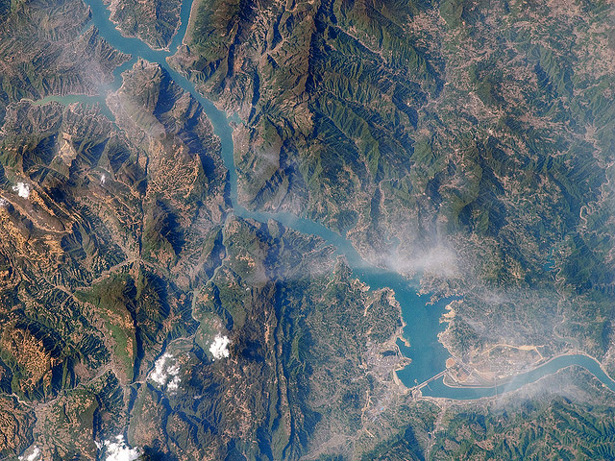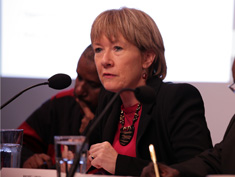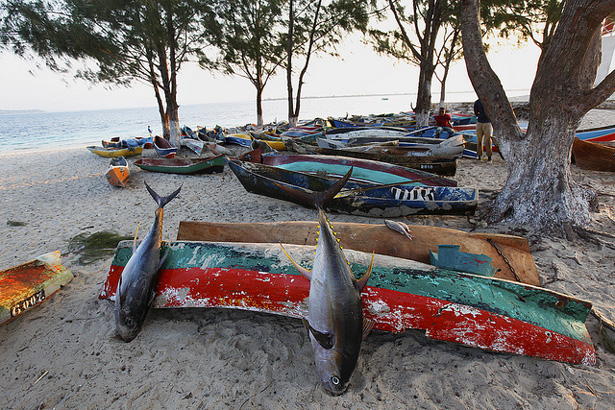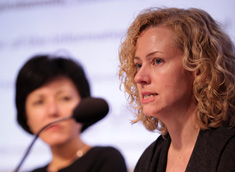-
Opportunity Amidst Conflict: Margie Buchanan-Smith on Long-Distance Trade and Peace-Building in Darfur
›
Trade is “the lifeblood of Darfur’s economy,” says Margie Buchanan-Smith in this week’s podcast.
Buchanan-Smith, a visiting fellow at Tuft University’s Feinstein International Center and the lead author of a recent study on livestock trade in Sudan, presented at the Wilson Center in November about the Feinstein Center’s collaboration with the UN Environment Program studying pastoralism in Sudan during the last decade of conflict.
-
Can China Solve Its Water-Energy Choke Point? Wilson Center Launches ‘China Environment Series 12’
›
Factories in China’s Pearl River Delta tick-tock around the clock, rapidly churning out gadgets from iPhones and Barbie dolls to forks and light bulbs, shipped off to village shops in Uganda and super Walmarts in America’s sprawling suburbs. But far from the global consumer’s view, manufacturing and rapid development are placing unrelenting pressure on China’s environment.
-
“What I See Is That Women Are Healthier…Children Are Healthier”: Vik Mohan on Blue Ventures’ Work in Madagascar
›Six years after beginning a marine conservation program focused on octopus fishery management in southwest Madagascar, “we can proudly say that we have made a real impact as an organization providing health care,” said Dr. Vik Mohan, medical director of Blue Ventures and a practicing doctor in the United Kingdom.
-
Natural Gas and Albacore: What Tuna Says About the Future of Mozambique
›January 13, 2014 // By Laura Henson
A 20-year peace accord between Mozambique’s two major political parties was brought to an abrupt end last fall. A series of violent skirmishes between FRELIMO and RENAMO resulted in at least 10 deaths, dozens injured, and fears that the country might relapse into the kind of political violence seen during its civil war, which left more than a million dead. RENAMO claims its frustrations stem from a fraudulent electoral system and social inequality, but some observers have suggested their motivations may be less benevolent: making sure they get their piece of the country’s newfound natural gas wealth.
-
“Essential to Prosperity and Opportunity”: Heather Boonstra on Adolescent Sexual and Reproductive Health
›
“If girls and young women are often thought of as the forgotten drivers of development, their sexual and reproductive health is almost entirely absent,” says the Guttmacher Institute’s Heather Boonstra in this week’s podcast.
-
Talking Science: Climate Change and Health Communications in a Skeptical Era
›Communicating complex scientific concepts to general audiences is difficult given today’s information overload. Capturing the attention of time-pressed policymakers long enough to explain multifaceted issues like climate change and global health is an even greater challenge. The Environmental Communications Division of the National Communication Association co-sponsored two panels at the Wilson Center on November 22 featuring communication directors and professors of communications to explore this issue. [Video Below]
-
Our Last Best Hope? Family Planning and Women’s Empowerment
›January 7, 2014 // By Laurie MazurThe original version of this article appeared on the Aspen Institute blog.
When journalist Alan Weisman proposed a new book on the challenges posed by human population growth, his editor said, “That one’s a live wire; don’t touch it.”
-
The Year That Resilience Gets Real
›2014 promises to be a superlative year – and that’s not necessarily a good thing. Complex, “super” disasters like Super Typhoon Haiyan are becoming more frequent, more systemic, and more destructive. Global trends, from population dynamics to food, water, and energy scarcities, threaten to further complicate the playing field. But by finally getting serious about resilience – the much discussed buzzword of 2013 – we might reduce our vulnerability, restore our communities, and build back better, rather than just picking up the pieces.
 A Publication of the Stimson Center.
A Publication of the Stimson Center.






